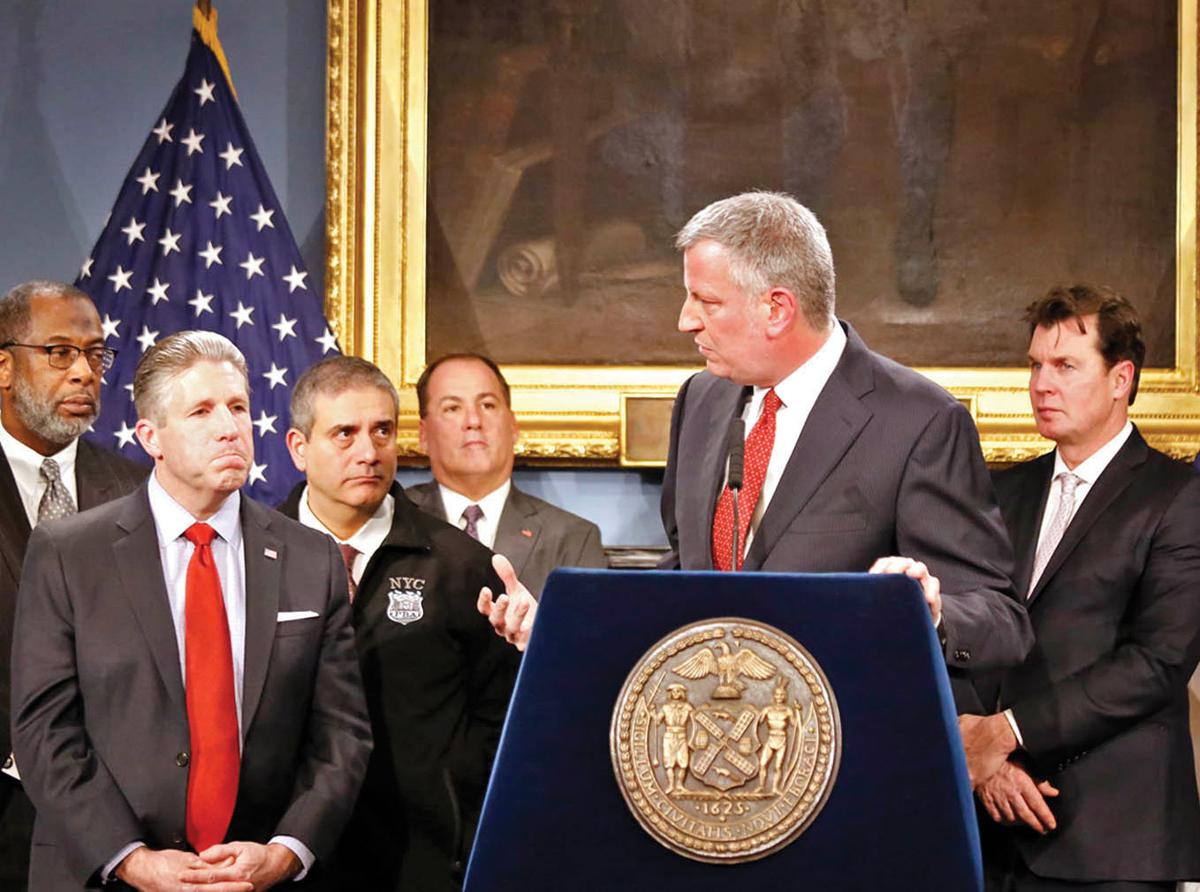





AND THIS WAS WHEN THEY WERE GETTING ALONG: Bargaining with the Patrolmen's Benevolent Association has been so tense over the years that even when they announced a contract deal 16 months ago, Mayor de Blasio, PBA President Patrick J. Lynch and at least one union board member didn't seem to be in a celebratory mood. As the two sides gird for arbitration, differences in how they compare Police Officer compensation with other jurisdictions figure to add to the acrimony.
It’s criminal the way city Police Officers are underpaid, argues the Patrolmen’s Benevolent Association. No they’re not, the city responds, arguing that their combined pay and fringe benefits put them ahead of many departments in the region.
Who’s right? It depends on how you count. The major dispute appears to be whether to include the NYPD’s generous benefits in salary calculations.
Regional Comparisons
The NYPD salary for that year was $83,976, which the PBA said was $15,511 below the average. NYPD officers would need a raise of 18.5 percent to catch up to the average of the other departments, the union said. By contrast, the city’s pattern of raises for uniformed unions in the most recent round of bargaining was 11 percent over seven years. The PBA managed to get another 2.25 percent last year that was described as a neighborhood-policing differential, with the city's costs for the extra money being offset at the expense of future hires.
The union is now seeking its fifth contract arbitration since 2002. PBA President Patrick J. Lynch said in April that the union’s goal was salary parity with State Troopers, who are assigned to patrol city transportation centers.
The city, in its figures, looked at direct cost, which includes fringe benefits. On a regional basis, it examined eight police departments in New York State and New Jersey as well as the NYPD. For the eight departments, the average direct cost on June 10, 2015 for an officer over 20 years was $99,411 a year, and the average cost of fringe benefits was $68,924, for a total cost of $168,335.
Generous Benefits
For the NYPD, the city said, the 2014 figures were $83,976 in direct cost plus $94,714 in fringes, for a total cost of $178,690. The NYPD benefits were higher than all eight comparable departments, with Nassau coming closest at $92,616. The average total cost of an NYPD officer came in third behind Suffolk ($186,105) and Nassau ($204,288) and ahead of the $168,335 average of the eight comparable departments.
The city also looked at 19 police departments in major cities across the country in 2014. Average direct costs plus fringes ranged from $70,761 in Detroit to $205,507 in San Jose, Calif. The NYPD, at $178,690, was behind only San Jose and San Francisco ($195,422).
Representatives of the union and the city discussed their figures and the accompanying arguments on condition of anonymity.
The PBA said it used salary because its officials thought that was the most appropriate measure. Its figures include longevity pay and night-shift differential but not overtime. Its representative said it provided pay comparisons only with unions in the region because that’s where the disparity is most acute.
The city said its direct-cost numbers include pension contributions and health care, plus the Variable Supplements Fund, which provides $12,000 a year to retirees, except for those on three-quarters disability pensions, and is unique to New York City.
Forget the Pensions
The union said that including pension earnings is dicey for a number of reasons. It argued in a submission to a Public Employment Relations Board arbitration panel that it should not consider the city figures on pensions and other fringe benefits.
Pensions are determined by the State Legislature, not by collective bargaining, and so are outside the scope of the Taylor Law, the union contended. That law mandates that an arbitration panel “compare only ‘wages, hours and conditions of employment,’ ” according to the union.
It argued that the inclusion of pension and health costs is “actuarially unsound” and "fatally flawed,” and quoted experts who “warned about the danger of conflating pension costs with the value of pension benefits.”
Further, according to the union submission, “there is no reason to believe prospective police officers compare the levels of benefits across jurisdictions when they make employment decisions.”
Money Talks
“Cops don’t worry about pensions, they worry about salary,” said a union representative.
The submission quoted an expert who said that for prospective officers when deciding where to apply, “the first priority is pay, it’s the most obvious, and the job, and then benefits might be considered as part of the package.”
The city representative stressed two factors: the extent of the fringe benefits, and the six-figure compensation for officers who are relatively young.
The representative noted that the average police officer is hired in his or her mid-twenties. Officers hit maximum pay after 5-1/2 years on the job. They also receive a $6,000 longevity payment starting in year five.
At that point, he said, their compensation—which includes salary, longevity, shift and community-policing differentials and holiday pay—equals $103,241. “This salary is for a 30-, 31-, 32-year-old.”
Officers qualify for half-pay pensions after 20 or 22 years and have free health care for the rest of their lives, he added. “We’re paying $103,000 and we have an incredibly generous benefit package that costs us as much if not more than the salary,” he said.
Further, he said, the NYPD has thousands of Detectives and supervisors, offering promotion opportunities that are not available in smaller departments.
And, he said, the NYPD does not go begging for prospective officers, indicating that any inadequacy in salary is not limiting the supply. “When the City Council added a thousand officers [in 2015], we had no problem filling that extra class with highly-qualified applicants,” he said.